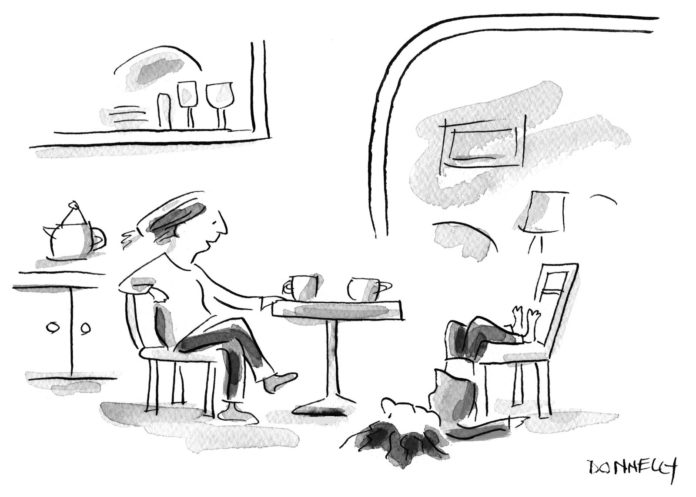Contract?
You don’t understand. We would like to pay you directly is what I’m saying. We pay the nurse services twenty-six an hour for your visits. I’m guessing you get half, maybe less—you don’t have to tell me. What I’m proposing is, we pay you directly, we deal with you directly, and you get all twenty-six dollars. Actually, we’re willing to pay you twenty-eight an hour. We think it would only be fair. In exchange, we ask that you be more flexible with your time, so that would mean taking my father as your sole client. And we can start with a minimum guarantee of thirty hours a week. That’s close to a thousand dollars. So, for a month, that would be nearly four thousand.
The figure was too miraculous to be successfully absorbed, and, also, fear was predominant in Flavia’s mind. But the company . . .
They’ll make trouble for you? I know it says in the contract that should we choose to hire you outright, from the nurse services, they will be owed a finder’s fee, half of it from us, half from you. But that’s only if they’re aware of the situation. What if they don’t know?
They will ask.
We will tell them that we’ve found family to take care of my father.
And when they ask why I quit?
Tell them you are going to school. And, meanwhile, you can actually go to school. You’re, what, twenty-five, twenty-six? And we’ll work with you. With your class schedule, within reason.
Only later, weeks after everything happened as Veronica had advised, did it occur to Flavia what a miracle it was to have crossed paths with the Ratkowski family.
Still, the situation will not last—in addition to diabetes, Roscoe has a bad heart, and he’s eighty-eight, almost eighty-nine. She has to continue her abstemious ways, living out the hard-luck immigrant narrative she signed up for when she left Manila for New York, where she knew no one.
For now, she is taking a course on the history of Western art, at Queensborough Community College. In her mind, the class is an experiment, though there is no question of dropping it now, halfway through the semester. It is hopeful role play, pegged to some shadowy notion of “improvement,” rather than a proper next step, which would lead to, say, accounting, or working at an office with computers—a veritable leap past sensible projections of the future, one that takes her beyond the borders of a legible map. For this kind of fancy, she has Roscoe to blame.
It helps that she is not the only female in History of Western Art. It also helps that the men are nearly all middle-aged, and the two young ones are gay. One of the older men is a Latin Romeo, with a pencil mustache and festive guayaberas, whose sweet talk is poison, only he pretends offense when you bring it to his attention. For such a man, Flavia has no energy to spare. She gives him the death stare, instead of wasting time on words, and he has learned to leave her be. Beyond contempt.
Beyond or beneath contempt?
She is working on a mid-semester essay on Vincent van Gogh, his art and the meaning of his life. If Wanda or Loreen heard about this, they would be laughing their asses off. But it’s been almost two years since Flavia quit the Blessed Rest Retirement Home, and almost a year since she last saw them, along with Artung and Lucing, for an early-morning catch-up over coffee, where the conversation was rowdy one moment, fitful the next. Rowdy because of the ebullience of the two Black women—Loreen, originally from Jamaica, and Wanda, from Liberia—and fitful because of Artung, who is Chinese, and Lucing and Flavia, both Filipina and with a diffidence that is almost familial.
In class, Flavia was the first to snap up van Gogh, leaving everyone else to settle for less popular artists. Poor Arturo, one of the two young gay guys, was stuck with the last choice—Braque!
Braque is wack.
But she has an inkling: Braque was someone who hated the way a book is formatted—maybe he was a struggling reader as a schoolkid—and his adult endeavor was to tear up those pages, thumbing his nose at the jailers and the wardens of his youth.
Who knows?
On the subway, each person has a life that Flavia can, if she wants to, embroider on, tease out into a story. But that’s the key: if she wants to. Most days, she can’t be bothered. Most days, she has adopted the hard-heartedness of her new home town, and stares straight ahead so that the mass of bodies becomes sweating, swaying wallpaper.
She reserves her emotion for Roscoe—that part of her life.
And also for Alina Viramontes Cruz, the professor of History of Western Art at Queensborough Community College. Who is also teaching Flavia’s new class: Modern American Painting. She admires Professor Viramontes Cruz.
Also for Veronica, who teaches E.S.L. at John Jay College, and might be going back to get a Ph.D. in special education. With Veronica, the mood is always upbeat, a transfer of energy, Flavia recognizes, from her E.S.L. classes, where patience and optimism are paramount.
Why is she thinking of Wanda and Loreen now? She has received a voice mail from Artung, asking her to be Artung’s date at a small reception in honor of Lucing’s engagement. Why did the invitation not come from Lucing herself? She hasn’t called back.
Here’s a triumph: Flavia has gone through the contents of both of Roscoe’s closets and got his judgment on each shirt, each tie, each coat, each pair of pants, each suit, and, most difficult of all, each pair of beautiful men’s shoes. (Not for Roscoe the dowdy comforts of athletic footwear or, God forbid, orthopedic shoes.) This was in response to a nudge from Veronica, albeit a soft one because of the morbid implications. The way Flavia put it to Roscoe was: You wear only your favorites and if there is room in the closets you can fill it with more new favorites. Also, she brought up St. Anthony’s, which has reached out to parishioners and Good Samaritans for men’s clothing that can be passed to the unfortunate who are living on the streets in Queens.
There is a second pass, and then a third, because it takes time for Roscoe to agree to part with things. In the end, there are nine large trash bags of donations. Flavia takes pictures on her phone and sends them to Veronica, who responds with three thumbs up. At day’s close, a volunteer from St. Anthony’s appears with a van, and Flavia helps him move the bags from the foyer to the rusty vehicle. In return, she gets a receipt that leaves the value of the gift blank, for Roscoe’s taxes.
The fucking government, Roscoe says, putting the receipt in a candy bowl on the ledge that separates the kitchen from the living room and is no longer used as a dining surface.
He once more mentions having had to disclose a secret Swiss account to the I.R.S., during a period of amnesty when the only penalty for withholding the information was back taxes and no jail term. With Roscoe, and, to a lesser extent, Veronica, this is what money talk sounds like. Though, to them, it is not so much money talk as life talk.
Roscoe holds a patent in mining technology. Something having to do with a system that separates water from grit—each going into a different tube—when you extract precious minerals from bodies of water. This accounts for Flavia’s thirty-or-so-hour workweek, four thousand dollars a month. Also for Veronica’s co-op on the Upper East Side.
Roscoe has agreed to late-in-the-day exercise, in the back yard, with the yoga ball, not just passing it back and forth but picking it up and then placing it down on the ground, to flex his waist and hip muscles, and the muscles of his abdomen. In exchange for the P.E., Flavia has agreed to sleep over. It’s a movie night that Veronica can’t make. Flavia will not be paid for these extra hours, and she does not know how much Veronica knows. She is not comfortable bringing it up. It is Veronica who hands her the paycheck, and Veronica who sends the weekly schedule, via e-mail; it is with Veronica that Flavia has to negotiate, if there happens to be an overlap with Modern American Painting.








